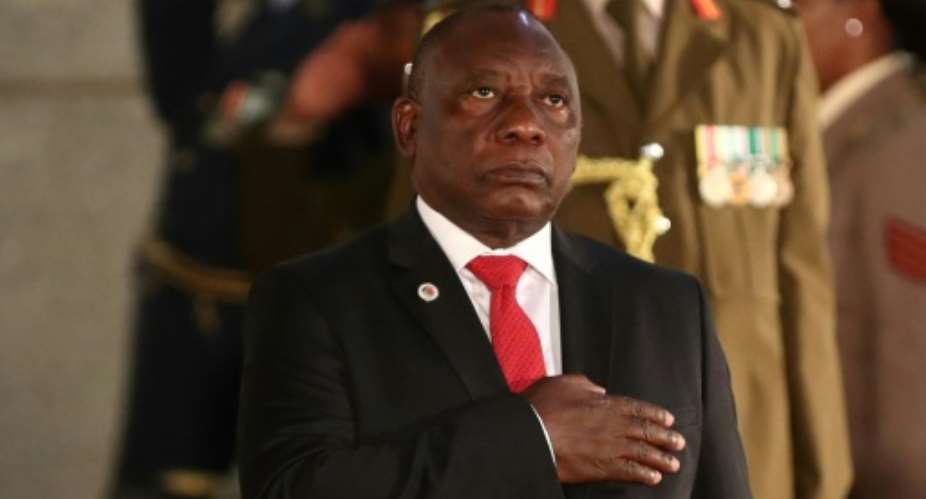South African President Cyril Ramaphosa on Thursday described the country's economic outlook as "extremely weak" as he vowed to speed up emergency funding for the debt-laden Eskom state power supplier.
Ramaphosa delivered a downbeat economic assessment in his first state-of-the-nation address since the ruling ANC party won elections in May.
"Our country is confronted by severe challenges. Our economy is not growing. Not enough jobs are being created. This is the concern that rises above all others," he said.
Ramaphosa came to power last year and has vowed to revive the economy after the scandal-tainted presidency of Jacob Zuma.
But unemployment remains near-record highs and the country's gross domestic product (GDP) contracted by 3.2 percent in the first three months of 2019.
"The economic outlook is extremely weak," he said. "For growth, we need a reliable and sustainable supply of electricity."
He warned that Eskom faced "serious financial, operational and structural problems" and could currently only meet its financial commitments until October.
Ramaphosa announced a special parliamentary bill would be introduced to rapidly allocate "a significant portion" of the 230 billion rand ($16 billion) needed by Eskom to survive.
 Ramaphosa said joblessness among the young of more than 50 percent was a national crisis. By Kim LUDBROOK (POOL/AFP)
Ramaphosa said joblessness among the young of more than 50 percent was a national crisis. By Kim LUDBROOK (POOL/AFP)
"Eskom is too vital to our economy to be allowed to fail," he said.
The state utility, which generates 90 percent of the nation's energy, has debts of $30 billion, and its potential collapse is seen as the biggest threat to spurring growth in Africa's most developed economy.
'A national crisis'
Eskom imposed a period of rotational power rationing in February, plunging offices, factories and homes into darkness for long hours and sparking public anger at the ANC government.
South Africa's unemployment hovers at over 27 percent -- soaring far higher among young people.
"The fact that the unemployment rate among young South Africans is more than 50 percent is a national crisis," Ramaphosa said.
 Ramaphosa cited five major goals for the coming decade -- ending hunger, economic growth outstripping population growth, two million jobs for young people, every 10-year-old being able to read and halving violent crime. By SUMAYA HISHAM (POOL/AFP)
Ramaphosa cited five major goals for the coming decade -- ending hunger, economic growth outstripping population growth, two million jobs for young people, every 10-year-old being able to read and halving violent crime. By SUMAYA HISHAM (POOL/AFP)
"More young people are entering the labour force every year... The brutal reality is that when it comes to youth unemployment, we have to run just to remain in the same place."
The ANC won the May 8 election with 57.5 percent of the vote, its smallest majority since it led the fight against apartheid rule that was replaced by multi-racial democracy in 1994.
Ramaphosa said he had five major 10-year goals: ending hunger, economic growth outstripping population growth, two million jobs for young people, every 10-year-old being able to read and halving violent crime.
He repeated his pledges to tackle government corruption and said he wanted South Africa to build a new city from scratch.
Mmusi Maimane, leader of the Democratic Alliance opposition party, said the "president talks in high dream language and fails to understand South Africans are living a nightmare."





 Lay KPMG audit report on SML-GRA contract before Parliament – Isaac Adongo tells...
Lay KPMG audit report on SML-GRA contract before Parliament – Isaac Adongo tells...
 Supervisor remanded for stabbing businessman with broken bottle and screwdriver
Supervisor remanded for stabbing businessman with broken bottle and screwdriver
 NDC watching EC and NPP closely on Returning Officer recruitment — Omane Boamah
NDC watching EC and NPP closely on Returning Officer recruitment — Omane Boamah
 Your decision to contest for president again is pathetic – Annoh-Dompreh blasts ...
Your decision to contest for president again is pathetic – Annoh-Dompreh blasts ...
 Election 2024: Security agencies ready to keep peace and secure the country — IG...
Election 2024: Security agencies ready to keep peace and secure the country — IG...
 People no longer place value in public basic schools; new uniforms, painting wil...
People no longer place value in public basic schools; new uniforms, painting wil...
 'Comedian' Paul Adom Otchere needs help – Sulemana Braimah
'Comedian' Paul Adom Otchere needs help – Sulemana Braimah
 Ejisu by-election: Only 33% of voters can be swayed by inducement — Global InfoA...
Ejisu by-election: Only 33% of voters can be swayed by inducement — Global InfoA...
 Minority will expose the beneficial owners of SML, recover funds paid to company...
Minority will expose the beneficial owners of SML, recover funds paid to company...
 Prof. Opoku-Agyemang has ‘decapitated’ the NPP’s strategies; don’t take them ser...
Prof. Opoku-Agyemang has ‘decapitated’ the NPP’s strategies; don’t take them ser...
